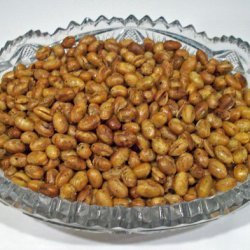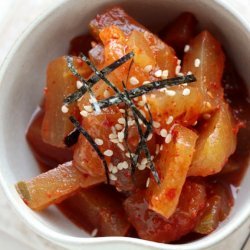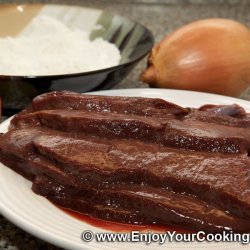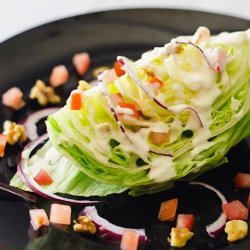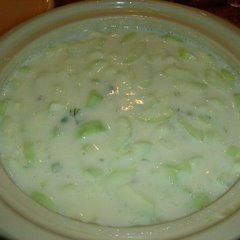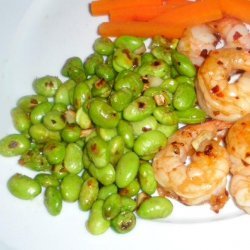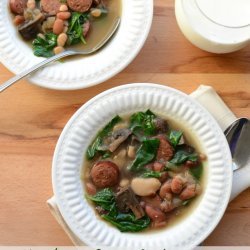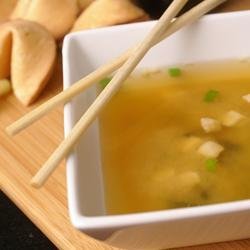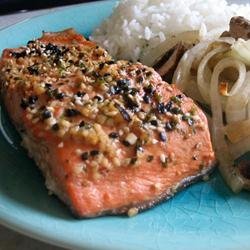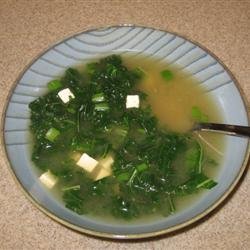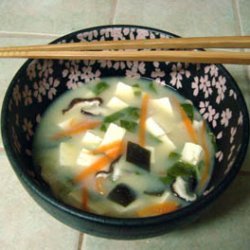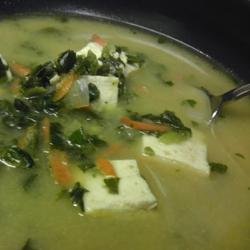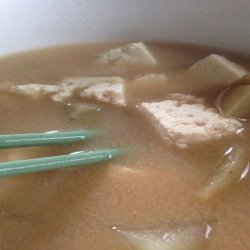Directions:
- First you want to sterilize all the utensils in boiling water before preparing to make miso.
- Next rinse the soybeans and soak in the water overnight or until the soybeans have approximately doubled in size.
- Then bring a large pot with the soybeans and soaking water to a boil, reduce flame to low and cook, covered, for approx. 3 to 4 hours or until soybeans are soft.
- Note: the soybeans can also be cooked in a pressure cooker.
- Next put the soaked beans with the soaking water in a pressure cooker and cook at max pressure for 40 minutes.
- Note: consult your pressure cooker manual for additional instructions.
- Then drain the beans into a colander, RESERVING the liquid.
- Now while the beans are still hot, mash the beans by hand until only about one-third of the soybeans are whole.
- Allow the beans to cool down to about 90-95 degrees F.
- Make sure to use the thermometer!
- Your Koji is like yeast, if the soybeans are too hot, it will kill the cultures.
- Now ake 200 ml of the reserved liquid (adding additional filtered water as needed) and dissolve the salt.
- Then add in this liquid slowly to the soybeans while stirring continuously.
- Next you will crumble the koji into the miso mixture and with your clean hands mix until you obtain a smooth mixture.
- Now to ferment the miso, use a heavy, glazed, ceramic, food-safe container.
- Then ub the inside of the container with 1 teaspoon of salt and add the miso mixture.
- Next you want to level the miso surface and sprinkle 1 teaspoon of salt across the surface, to prevent unwanted molds and bacteria from spoiling the air-exposed areas.
- Then cover the miso with piece of parchment paper cut to fit the container exactly.
- Now press the paper firmly on the miso, smoothing out wrinkles and bubbles.
- Then you can top with a round wooden lid that just fits in the container (sitting directly on top of the miso) and about 10 pounds of weights.
- Now you can cover the top of the container with wax or parchment and tie in place with cotton kitchen string.
- Make sure if your container is large enough, you can repeat the steps above on subsequent days to make more batches of miso, making sure to leave several inches of headspace to be able to sufficiently cover, weight and wrap the container.
- Note: remember to salt the container and the top of the miso each time you make additions to the container.
- Now you can place the miso container in a dark, clean, cool room.
- Your miso will be ready after 12 months fermentation.
- Make sure during the fermentation some liquid (tamari) will rise to the surface.
- You need to know if no liquid tamari is seen on the surface then the pressing weight must be increased.
- Don't peek.
- Now $opening the container while it is fermenting causes it to lose quality.
- You will need to check it occasionally to make sure that the tamari is rising to the top, but this should be done infrequently, once every couple of months or so.
- Your miso can be kept in the container for a few years.
Nutrition Facts
| Amount Per 1 Serving | |||
| Calories | 1010.91 Kcal (4232 kJ) | ||
| Calories from fat | 347.15 Kcal | ||
| % Daily Value* | |||
| Total Fat | 38.57g | 59% | |
|---|---|---|---|
| Sodium | 62847.96mg | 2619% | |
| Potassium | 2492.96mg | 53% | |
| Total Carbs | 110.08g | 37% | |
| Sugars | 5.29g | 21% | |
| Dietary Fiber | 31.86g | 127% | |
| Protein | 73.15g | 146% | |
| Vitamin C | 116mg | 193% | |
| Iron | 21.3mg | 118% | |
| Calcium | 985.5mg | 99% | |
| Amount Per 100 g | |||
| Calories | 87 Kcal (364 kJ) | ||
| Calories from fat | 29.88 Kcal | ||
| % Daily Value* | |||
| Total Fat | 3.32g | 59% | |
|---|---|---|---|
| Sodium | 5408.6mg | 2619% | |
| Potassium | 214.54mg | 53% | |
| Total Carbs | 9.47g | 37% | |
| Sugars | 0.45g | 21% | |
| Dietary Fiber | 2.74g | 127% | |
| Protein | 6.29g | 146% | |
| Vitamin C | 10mg | 193% | |
| Iron | 1.8mg | 118% | |
| Calcium | 84.8mg | 99% | |
* Percent Daily Values are based on a 2000 calorie diet. Your daily values may be higher or lower depending on your calorie needs.
Find out how many calories should you eat.
Get Your Recipe of Health!
Follow RecipeOfHealth on Facebook!


